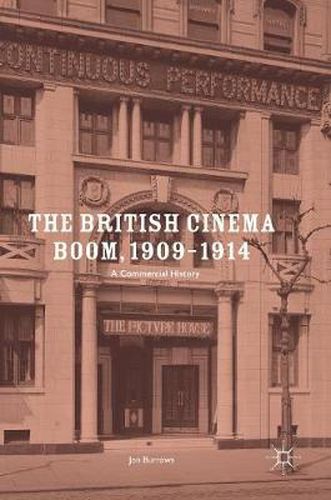Readings Newsletter
Become a Readings Member to make your shopping experience even easier.
Sign in or sign up for free!
You’re not far away from qualifying for FREE standard shipping within Australia
You’ve qualified for FREE standard shipping within Australia
The cart is loading…






This title is printed to order. This book may have been self-published. If so, we cannot guarantee the quality of the content. In the main most books will have gone through the editing process however some may not. We therefore suggest that you be aware of this before ordering this book. If in doubt check either the author or publisher’s details as we are unable to accept any returns unless they are faulty. Please contact us if you have any questions.
This book examines why thousands of cinemas opened in Britain in the space of a few years before the start of the First World War. It explains how they were the product of an investment boom which observers characterised as economically irrational and irresponsible. Burrows profiles the main groups of people who started cinema companies during this period, and those who bought shares in them, and considers whether the early cinema business might be seen as a bubble that burst. The book examines the impact of the Cinematograph Act 1909 upon the boom, and explains why British film production seemed to decline in inverse proportion to the mass expansion of the market for moving image entertainment. This account also takes a new look at the development of film distribution, the emergence of the feature film and the creation of the British Board of Film Censors. Making systematic and pioneering use of surviving business and local government records, this book will appeal to anyone interested in silent cinema, the history of film exhibition and the economics of popular culture.
$9.00 standard shipping within Australia
FREE standard shipping within Australia for orders over $100.00
Express & International shipping calculated at checkout
This title is printed to order. This book may have been self-published. If so, we cannot guarantee the quality of the content. In the main most books will have gone through the editing process however some may not. We therefore suggest that you be aware of this before ordering this book. If in doubt check either the author or publisher’s details as we are unable to accept any returns unless they are faulty. Please contact us if you have any questions.
This book examines why thousands of cinemas opened in Britain in the space of a few years before the start of the First World War. It explains how they were the product of an investment boom which observers characterised as economically irrational and irresponsible. Burrows profiles the main groups of people who started cinema companies during this period, and those who bought shares in them, and considers whether the early cinema business might be seen as a bubble that burst. The book examines the impact of the Cinematograph Act 1909 upon the boom, and explains why British film production seemed to decline in inverse proportion to the mass expansion of the market for moving image entertainment. This account also takes a new look at the development of film distribution, the emergence of the feature film and the creation of the British Board of Film Censors. Making systematic and pioneering use of surviving business and local government records, this book will appeal to anyone interested in silent cinema, the history of film exhibition and the economics of popular culture.